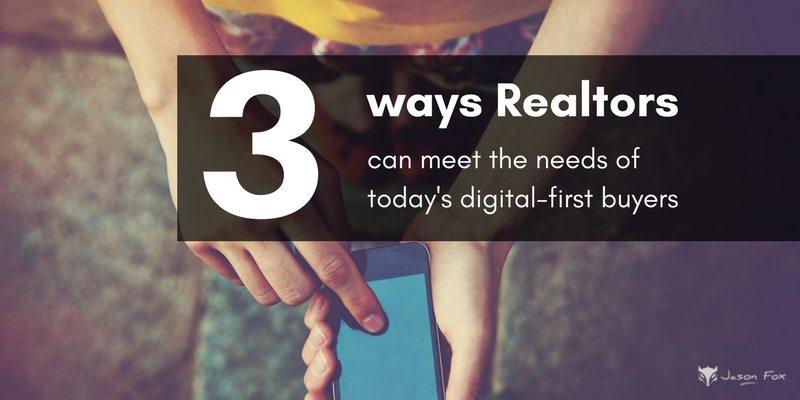3 Ways Realtors Can Meet the Needs of Today’s Digital-First Buyers
Now, more than ever, consumerism has taken a turn toward the digital space, as emerging tech is helping to shape consumer behavior. Indeed, more and more people are shopping and exploring buying options online via their computers, tablets and, even more so, their smartphones.
[clickToTweet tweet=”Since 2016, mobile and tablet internet usage exceeds desktop. via @jasonfox_me #mobile” quote=”Since 2016, mobile and tablet internet usage exceeds desktop.” theme=”style3″]Today, in most industries, including real estate, customers want access to information quickly and easily. Oh, and also digitally.
Here are three ways you can enhance your customers’ digital experience and, in turn, increase your sales.
1. Provide an Appealing Mobile Experience
In the recent past, developing an appealing website was a necessity — and that’s very much still the case. But today, consumers are also looking for a great mobile experience. Still, when it comes to specific mobile devices, convenience reigns.
Online shoppers, including those who enjoy this activity from the comfort of their own homes, want an easy, enjoyable and overall seamless experience. Bottom line: They want to expend as little effort as possible through a great mobile-enabled experience.
When considering mobile web design, it’s important to consider the obvious: that mobile devices have a smaller screen view than laptops. As such, experts suggest:
- Develop and use a responsive design; this will let your content be viewable on various devices.
- Create only one website, which should be optimized for today’s internet browsers and smartphones. Indeed, having one website will help your company avoid being penalized by Google for duplicated content.
- Consider font size on various areas of your website. Experts say a 14-point body font is ideal for your main page copy.
- Include high-resolution images throughout your website; after all, many of us are visual learners. Plus, you’ll want to avoid uploading any pixelated or blurred photos.
2. Develop a Nuanced Social Media Strategy
Experts say real estate agents should liken social media to their offline social interactions. Moreover, social media should be an integral part of your business, allowing you to connect with potential clients and increase your sales.
First and foremost, be sure to have a presence on Facebook, with a page that represents your business rather than you personally. For example, you’ll want to share plenty of images of the homes you plan to sell, along with key elements of the neighborhoods in which you represent.
Indeed, no amount of beautifully cultivated website copy can replace or even replicate the photos and video tours of your homes. Additionally, you’ll want to humanize your business and show your results by sharing photos of the families who wind up purchasing a home through you. All of this tells a real (estate) story.
Experts also point to the power of geo-targeted ads on Facebook and Twitter to reach your ideal audiences. Likewise, you can sprinkle in use of other social media channels to promote your business, including Instagram, Pinterest or Snapchat to see what works best for you and your clientele.
Don’t forget Quora an often overlooked social media channel that show you as a local expert.
Turn to a Cloud Contact Center
Finally, for the ultimate in a digital-first experience for your customers, consider a cloud contact center.
Savvy businesses find investing in a cloud contact center greatly enhances the customer experience through seamless interactions and transitions from one channel to the next. Indeed, cloud contact centers act as the first line of defense in providing exceptional customer service and a competitive advantage.
This type of customer service and support is achieved through a network of servers that run applications or provide services in order to better and more quickly react to customer issues anytime, anywhere. All without a significant upfront investment in IT — just a computer and a Wi-Fi connection.
Additionally, cloud-based contact centers allow staff to work from virtually anywhere in an efficient and productive manner, much like a traditional office setting. In all, cloud contact centers let you adapt to customers who desire an omni-channel service experience.
So, the question is — How do you plan to offer your customers a digital-first experience?
post contents
Now, more than ever, consumerism has taken a turn toward the digital space, as emerging tech is helping to shape consumer behavior. Indeed, more and more people are shopping and exploring buying options online via their computers, tablets and, even more so, their smartphones.
[clickToTweet tweet=”Since 2016, mobile and tablet internet usage exceeds desktop. via @jasonfox_me #mobile” quote=”Since 2016, mobile and tablet internet usage exceeds desktop.” theme=”style3″]Today, in most industries, including real estate, customers want access to information quickly and easily. Oh, and also digitally.
Here are three ways you can enhance your customers’ digital experience and, in turn, increase your sales.
1. Provide an Appealing Mobile Experience
In the recent past, developing an appealing website was a necessity — and that’s very much still the case. But today, consumers are also looking for a great mobile experience. Still, when it comes to specific mobile devices, convenience reigns.
Online shoppers, including those who enjoy this activity from the comfort of their own homes, want an easy, enjoyable and overall seamless experience. Bottom line: They want to expend as little effort as possible through a great mobile-enabled experience.
When considering mobile web design, it’s important to consider the obvious: that mobile devices have a smaller screen view than laptops. As such, experts suggest:
- Develop and use a responsive design; this will let your content be viewable on various devices.
- Create only one website, which should be optimized for today’s internet browsers and smartphones. Indeed, having one website will help your company avoid being penalized by Google for duplicated content.
- Consider font size on various areas of your website. Experts say a 14-point body font is ideal for your main page copy.
- Include high-resolution images throughout your website; after all, many of us are visual learners. Plus, you’ll want to avoid uploading any pixelated or blurred photos.
2. Develop a Nuanced Social Media Strategy
Experts say real estate agents should liken social media to their offline social interactions. Moreover, social media should be an integral part of your business, allowing you to connect with potential clients and increase your sales.
First and foremost, be sure to have a presence on Facebook, with a page that represents your business rather than you personally. For example, you’ll want to share plenty of images of the homes you plan to sell, along with key elements of the neighborhoods in which you represent.
Indeed, no amount of beautifully cultivated website copy can replace or even replicate the photos and video tours of your homes. Additionally, you’ll want to humanize your business and show your results by sharing photos of the families who wind up purchasing a home through you. All of this tells a real (estate) story.
Experts also point to the power of geo-targeted ads on Facebook and Twitter to reach your ideal audiences. Likewise, you can sprinkle in use of other social media channels to promote your business, including Instagram, Pinterest or Snapchat to see what works best for you and your clientele.
Don’t forget Quora an often overlooked social media channel that show you as a local expert.
Turn to a Cloud Contact Center
Finally, for the ultimate in a digital-first experience for your customers, consider a cloud contact center.
Savvy businesses find investing in a cloud contact center greatly enhances the customer experience through seamless interactions and transitions from one channel to the next. Indeed, cloud contact centers act as the first line of defense in providing exceptional customer service and a competitive advantage.
This type of customer service and support is achieved through a network of servers that run applications or provide services in order to better and more quickly react to customer issues anytime, anywhere. All without a significant upfront investment in IT — just a computer and a Wi-Fi connection.
Additionally, cloud-based contact centers allow staff to work from virtually anywhere in an efficient and productive manner, much like a traditional office setting. In all, cloud contact centers let you adapt to customers who desire an omni-channel service experience.
So, the question is — How do you plan to offer your customers a digital-first experience?
Latest articles
First-time homebuyers are probably eager to find their forever home in the housing market. However, there’s plenty of mystery behind the buying landscape, how to purchase and other considerations they should make.
Unlock the potential of content marketing in real estate with actionable strategies designed to boost your online presence and engage clients effectively.
The Importance of Google Rankings for Real Estate Agents Over the past fifteen years, I’ve seen how a good Google ranking can make or break a real estate business. Higher rankings mean more people seeing
BECOME A MEMBER
Become A Free DIY Real Estate Marketing Member & Get Access To:
LARGEST COLLECTION OF
Real Estate Marketing e-Books, Guides, Templates, & whitepapers
ON THE INTERNET
+ OVER 70 How To Website Training Videos including; WordPress, Agent Evolution Themes, & IDX Broker
+ DIY Real Estate Marketing Tips and Strategies Delivered to Your Inbox
Share this article
recent posts
Written by : jasonfox
Jason Fox - Real Estate Marketing
Business: We build WordPress Real Estate Websites with IDX
Me: #GoHawks, #BringBackTheSonics, #MaybeNextYearMariners, #ILoveMyKids #SeattleSunLover #SeattleWaterLover #BFF
Blog: Focuses on Wordpress Websites, Content Management, SEO Services, SEM Campaigns, Social Media Marketing, Email Marketing, Beautiful Design, IDX, and more.





